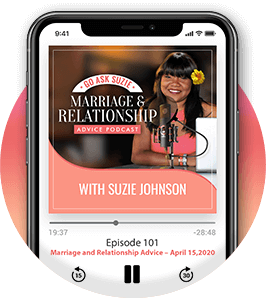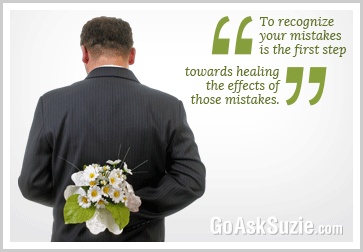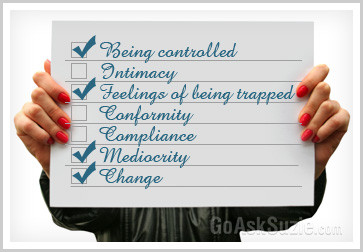Are you someone who’s married and cheating, or have you had an extramarital affair in the past?
What does having an affair say about YOU?
Here’s why I ask: all behavior has a cause. A poor relationship might leave the door open for infidelity, but the decision to walk through is a personal choice.
If you’re married and cheating, or you’ve had an extramarital affair sometime in the past, rather than beat yourself up, throw tantrums, blame circumstances or stage another pity party… I challenge you to search for your motives, and let this experience become a journey of self-discovery.
What’s happened has happened. Now it’s time to do some work, and look for answers within.
DISCOVERING THE HIDDEN
“The grass may look greener on the other side until you discover that it takes the same time and effort to grow.”
There may have been more to your decision to cheat than you realize.
The following five questions are designed to help you shift the focus OFF the behavior and ONTO its cause. Each question is aimed at helping you gain more insight into the thoughts, beliefs and decisions that led you to make the choices you made.
For example:
If you have a family history of infidelity, having an affair could have been a learned behavior. If so, you now have to resolve to unlearn those lessons.
Get out a notebook (or a blank sheet of paper) and write down your answers to each of the following questions. (If you’re feeling truly courageous, you might even want to share your insights with your partner.)
If you let them, these questions can become great discovery tools. They can really open the doors to intimacy and jump-start positive communication between you and your partner.
The 5 Questions Every Wayward Partner Needs to Ask
- To regain the thrill
- To prove they still have it and can get it
- To one-up a partner for revenge or spite, or to even the score
- To boost ego and validate sexual attractiveness
- To make up for sexual rejection in the primary relationship
- To pursue romance or adventure
In hindsight, many wayward spouses look back and realize that what they were truly seeking from the affair was distraction, relief or escape from problems at home.
To help you get clear about YOUR personal motives, ask yourself, “what fantasies, wants or needs do I have that are NOT being met in my primary relationship?”
Now, on a blank sheet of paper, make these three columns:
Fantasies || Wants || Needs
Then, under each column, list everything you can think of. (Give yourself at least 5-10 minutes to make a complete list.)


Whenever I give people infidelity advice, I notice most of them have a really difficult time hearing the word no.
You see this in all areas of life. If a person loses a big account, misses a flight, gets passed over for a promotion, they seem to take it as a sign of personal failure. If their partner isn’t in the mood or says no to doing what they want, they see it as a personal rejection. Rather than letting it go or being flexible, the word NO is internalized as an attack.
Why is recognizing how you deal with disappointment important?
Because not being able to hear, handle or cope with disappointment can lead us to take things way too seriously. If we internalize the word “no” as a personal rejection, that feeling can cause us to spin off into self-pity, anger and resentment. You’d be surprised to know how many times we store up personal resentments and retaliate for perceived wrongs… all because we haven’t been able to correctly process being told “no”.
So ask yourself:
Up until now, how have YOU dealt with hearing the word “no”? How do YOU respond to disappointments (both large and small)?
For example:
If your flight gets delayed or canceled, do you roll with the punches? Or do you feel it as a blow to your self-esteem? Do you get angry? Do you sulk?
Infidelity is often a flat-out rebellion or a way of pushing against an unwanted situation (or feeling). It’s important to acknowledge and bring to light the things you feel a natural resistance to and a strong rebellion toward. In other words, the things you push against.
Here’s a list of things people tend to push against. (Make note of any that applies to you, or add your own to the list ):
- Being controlled
- Intimacy
- Feelings of being trapped
- Conformity
- Compliance
- Mediocrity
- Change

BOREDOM is often Enemy #1 for monogamous relationships.
In my premarital coaching, this is the number one thing I teach couples to deal with. Personally, I believe if more people knew how to handle their restless minds, thoughts and feelings, the divorce rate would plummet overnight.
Many people assume the antidote to boredom is adventure.
Sure, adding a little adventure helps, but more often than not, people just wind up creating drama and mistake that for adventure.
Key Point: The choice to cheat is a choice for drama, NOT adventure.
So how do you handle boredom?
Here are several ineffective ways people use to try to escape boredom:
- Shopping (a.k.a. retail therapy)
- Overeating
- Surfing the web
- Watching TV
- Gossiping
- Reading romance, sci-fi, or adventure novels
What’s on YOUR list? Take a minute to write down your favorite ways to run from boredom.
Facing one’s fear is part of the human experience, yet many people aren’t aware how much fear runs their lives. Managing fear is about managing degrees. We all face the same fears… just to varying degrees.
Here’s a simple exercise to give you some insight into what fears may have the biggest control over YOU.
Below are 5 fears. Copy them onto a sheet of paper and carefully read each one. Using a scale of 1-5 and using each number only once, prioritize your fears, with 1 being the strongest and 5 the weakest.
Fear of Dying | 1 2 3 4 5 |
Fear of Being Abandoned | 1 2 3 4 5 |
Fear of Aging | 1 2 3 4 5 |
Fear of Loss | 1 2 3 4 5 |
Fear of Decline of Sexual Attraction | 1 2 3 4 5 |
WHERE DO YOU GO FROM HERE?
By your willingness to question your own motives, beliefs and fears… I believe you have taken an important step. I congratulate you for having the courage to look at yourself.
Of course, there’s more. Taking responsibility for mistakes is only the first step toward correcting them. There are other steps in the process that shouldn’t be overlooked.
- Accept complete responsibility for your mistakes.
- Sever all contact with the third party.
- Answer all your primary partner’s questions.
- Be patient with the emotional roller coaster.
- Be respectful of your primary partner’s need to talk about it.
- Be willing to report in as to your whereabouts.
- Accept that it may take a long time to regain your primary partner’s trust.
- Forgiving YOURSELF makes it easier for your spouse to forgive you.
And the BIGGEST thing you can do is:
BE WILLING TO STAND IN THE STORM YOU CREATED.
Yes, it’s going to be a rough and uncomfortable process. Yes, there will be lots of emotional ups and downs. Be prepared… it’s going to be difficult for everyone. No matter how much you wish for it to end quickly, the healing and recovery can’t be rushed. There are no shortcuts. The best thing you can do is to plant your feet firmly and squarely on the ground and be willing to wait out the storm.

Say to yourself, “this is a storm that I created. I made a mistake in creating it. I’m not willing to hide or run away from it. I will do what I can to help undo this mistake.”
Let me reassure you… in the long run, if you’re married and cheating or have been involved in an affair, it’s better to face the consequences directly than to hide, deny or run away from them.
Today, you’ve taken the time to learn more about yourself. If nothing else, what you have done demonstrates a REAL willingness to face your mistakes responsibly.
Are you ready for things to get back to normal?
It’s not easy being the one that disappointed OR to let another person down. There’s a tremendous weight and sense of failure that comes along with it.
Chances are you’re ready to put this unpleasantness behind you… but your partner can’t seem to let it go.
This is where I can help.
If you’re tired of walking on eggshells, tired of seeing that hurt look in the eyes, tired of feeling guilty, tired of feeling shame for what you’ve done, tired of explaining, exhausted from the constant tension… then I encourage you to be willing to accept some help in getting things back on track.
If you would like for me to help you get back on the right track, then I would be honored to do so.
You can go here to learn more about working with me. If we do wind up working together, I’ll share with you exactly what to do, as well as how to do it.
Until we speak again…
Remember… Love Wins!

Don’t forget… You can now get over 13.5 hours of my best Wayward Partner strategies. Learn More Here







































